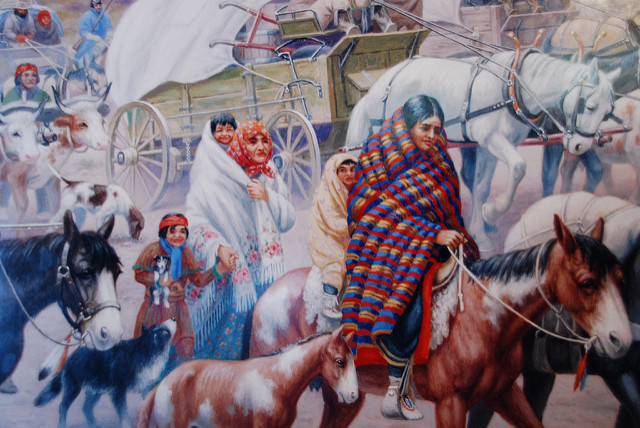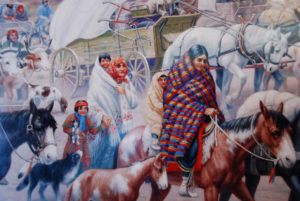Speaking on behalf of my people, the Cherokee, is a tricky task. We are varied in how much we know and understand about our history and culture. Thanks to Columbus and the other “first” Europeans who came after him, we are now a people racing the clock to gather knowledge from the minds of the elders before they pass, taking another section of a cultural library with them. I will share how I know our story as it was told to me through spoken word and written literature.
When I was asked to write this article, I first “googled” the term, “Columbus Day.” I was curious how the world perceived it in this day and time. Mostly, I saw sales ads from a variety of retail outlets. Another opportunity to increase the bottom line, I suppose. To be fair, it is a day of celebration, but we must be mindful that from the perspective of “indigenous eyes,” it is a day that symbolizes victory for a, “dominant” culture.
Our world had to be a curious thing for the Europeans. They came from a civilization where males had dominance over females in social and political matters. We did not have a central government. Each town had its own social and political unit. To the European mindset, land and other materials were mere currency to be owned and used as collateral. To us, it was like to trying to own the air, or the clouds, but the burning desire European settlers had for it was to be our undoing.
Our ancestors embraced a matriarchal system where women held influential positions in war, society, and politics. They decided the fate of war criminals, and could overturn decisions made by men in the highest positions of politics. It wasn’t any type of coercion women held, it was respect. Cherokee women ensured the future of the Cherokee nation by giving birth.
Columbus Day is a U.S. holiday that commemorates the landing of Christopher Columbus in the Americas in 1492. It became a federal holiday in 1937. It is on Monday, October 8, 2018. The Cherokee community, will not be celebrating. We are a sovereign nation that makes its own laws. We have, instead, established, “Cherokee Heritage Day,” which we celebrate the Wednesday of the week of our annual Cherokee Fair. The Fair is 106 years old, and counting.
The “dominant” culture established Columbus Day and has erected statues in his honor. To us, this only serves to sanitize actions designed to take the ultimate prize: land.
“Unehlvnvi (God),” created us in His image. He gave us our lifeways and asked us to care for them forever. They didn’t die; they simply went underground for awhile.
Columbus “discovered” a place where people already lived. We, Cherokee, are still here.
Sources Cited
https://www.history.com/topics/exploration/columbus-day
http://time.com/4968067/indigenous-peoples-day-columbus-day-cities/, accessed October 4, 2018.
https://www.history.com/news/goodbye-columbus-hello-indigenous-peoples-day
- https://classroom.synonym.com/the-cultural-differences-in-native-americans-and-european-americans-12083418.html
- A Native AmericanEncyclopedia: History, Culture & Peoples,” Barry Pritzker, 2000
- “Encyclopedia of North American Immigration” John Powell, 2005
- American Indian: Volume 1: Harvey Markowitz, 1995
- The Cultural Differences in Native Americans and European Americans, Billy McCarley, updated, 2017
- http://www.manythings.org/voa/history/5.html
- https://indiancountrymedianetwork.com/news/native-news/cherokee-nation-accepts-ruling-freedmen/
- “Sifters: Native American Women’s Lives.” Theda Perdue
- http://www.okhistory.org/publications/enc/entry.php?entry=RE001
- www.usgennet.org/usa/ok/state/outlet/strip.html
- Annie H. Abel, The American Indian Under Reconstruction (Cleveland, Ohio: Arthur H. Clark Co., 1925).
- Minnie Thomas Bailey, Reconstruction in Indian Territory: A Story of Avarice, Discrimination, and Opportunism (Port Washington, N.Y.: Kennikat Press, 1972).
- Angie Debo, The Road to Disappearance (Norman: University of Oklahoma Press, 1941).
- Charles J. Kappler, comp. and ed., Indian Affairs: Laws and Treaties, 7 vols. (Washington, D.C.: GPO, 1904–1979).
- William D. Pennington, “Reconstruction Treaties,” The Encyclopedia of Oklahoma History and Culture


There are no comments
Add yours